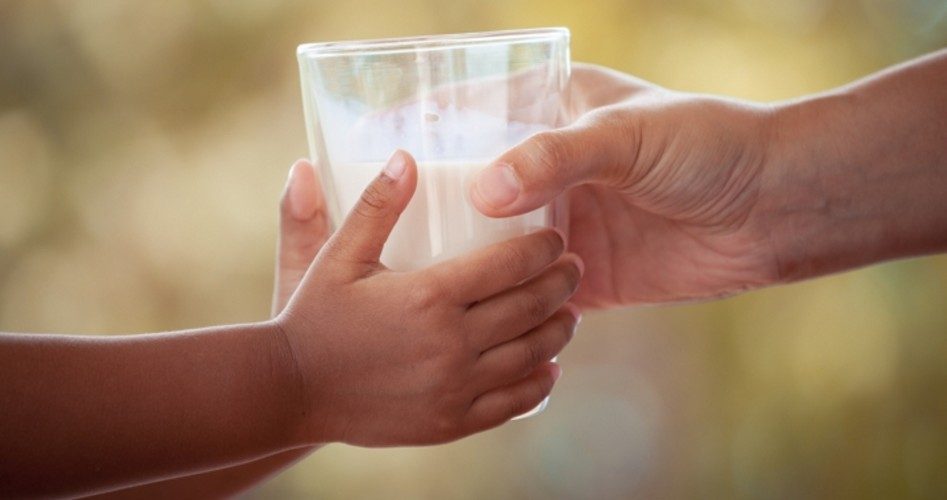
California’s Senate has proposed another Nanny State bill that, if passed, would likely hurt private businesses without achieving what it claims to set out to do: combat childhood obesity. To address the state’s growing concerns over childhood obesity, the bill seeks to require restaurants to include only select default beverages deemed healthy by the state with all children’s menu items. The bill passed the State Assembly on August 16.
SB1192, proposed by Democratic Senate Majority Leader Bill Monning, intends to combat childhood obesity by mandating default beverages for children’s menu items.
The bill reads:
A restaurant that sells a children’s meal shall make the default beverage offered with the children’s meal one of the following: (1) water, sparkling water, or flavored water, with no added natural or artificial sweeteners. (2) Unflavored milk. (3) A nondairy milk alternative that contains no more than 130 calories per container or serving.
Only those aforementioned items are to be listed and displayed as beverage options with the children’s meal.
The bill does not prohibit restaurants from selling an alternative beverage if the purchaser of the meal requests one, but restaurants that do not limit the default beverages to those outlined in the bill are subject to fines.
The bill borrows a page right out of President Obama’s Social and Behavioral Science Team, which advocated using behavioral psychology on citizens for the purposes of policymaking. President Obama’s affinity for the use of this science to influence the American people was immediately clear when he selected Cass Sunstein to serve as his regulatory czar. Sunstein authored a book on the use of behavioral psychology, entitled Nudge — Improving Decisions About Health, Wealth, and Happiness, which provided a variety of behavioral psychology measures to “nudge” Americans toward healthier lifestyles while causing them to think that in fact they are making the decisions themselves.
Sunstein believes that the presence of too many choices can be confusing to people. In describing the premise of his book, he essentially claimed that the American people were too ignorant and undisciplined to make proper decisions. “We think there is a little Homer Simpson in all of us,” he asserted. “Sometimes we have self-control problems, sometimes we’re impulsive. In these circumstances, both public and private institutions, without coercing, can make our lives a lot better.”
And though President Obama no longer sits in the White House, California is all too happy to subscribe to similar philosophies. After all, SB 1192 is not out of the ordinary in California, home to many overreaching measures, including a ban on McDonald’s Happy Meal toys, prohibitions against wood-burning fireplaces in newly constructed homes, and the more recent plastic straw ban.
And like its predecessors, SB 1192 is unlikely to have the results the legislature intended, but will certainly come at a costly expense to restaurant owners, who would need to update their menus to ensure that only the beverages approved in the bill are listed or displayed for a children’s meal.
The bill introduces the measure by addressing the obesity epidemic in California that continues to grow among children in the state. The bill goes on to explain that obese children are “at least twice as likely as nonobese children to become obese adults.” Those adults are then vulnerable to negative health consequences, including type 2 diabetes, heart disease, certain cancers, mental health issues, and other chronic and debilitating conditions.
And while these are all legitimate concerns, particularly where social services are already bankrupting the state, the bill once again removes the burden of raising healthy children from the parents and places it squarely on the shoulders of private industry and the state.
“Many families lack adequate time to obtain and prepare healthy food, making dining out an appealing and often necessary option. As a result, more than one-half of food expenditures in the United States are spent outside the home. Nationwide, American children eat 25 percent of their calories at fast food and other restaurants. Children consume almost twice as many calories when they eat a meal at a restaurant as they do when they eat at home.
By enacting this act, it is the intent of the Legislature to support parents’ efforts to feed their children nutritiously by ensuring healthy beverages are the default options in children’s meals in restaurants.”
Critics of the bill argue that these sort of decisions should rest with the parents, not the government.
“Seriously, like, what’s next?” California Assemblyman Matthew Harper (R-Huntington Beach) said. “Are we going to insist that you have to have kale in your salad unless you specifically ask otherwise?”
It should not come as a total shock that the state would prefer to remove parents from the equation when it comes to guiding children’s behaviors. As noted by the Daily Wire, after all, it is the state’s very same distrust in parents that allows minors to get abortions without the need for parental consent.
Image: Sasiistock via iStock / Getty Images Plus




